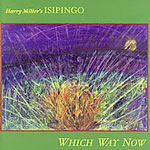Home » Jazz Articles » Album Review » Harry Miller's Isipingo: Which Way Now
Harry Miller's Isipingo: Which Way Now
Recorded for Radio Bremen in 1975, Which Way Now features Miller's Isipingo sextet. It's a refreshingly vibrant acoustic jazz album, recorded at a time when most of his peers were pursuing the carrot of fusion. Combining traces of his African roots with a more open-ended improvisational aesthetic, it also strongly reflects the influence of jazz icon John Coltrane. Four extended pieces ranging from 15 to 21 minutes show Miller's ability to provide maximum freedom and avoid compromise. Pervasive rhythms that only occasionally dissolve into total freedom also keep them completely accessible.
The performance was recorded less than a month before another South African ex-pat, trumpeter Mongezi Feza, passed away in December, 1975 at only 30. A sharp-toned player who left a small but fine body of work, Feza is perhaps best known for his work on singer/songwriter Robert Wyatt's early records. Here he's at his best on the mid-tempo, modal "Eli's Song, where his own sense of construction combines with a certain abandon. He's matched by Mike Osborne, who may be an altoist, but is clearly informed by Coltrane's assertive stance.
The spirit of Coltrane may loom over this session, but the presence of pianist Keith Tippett takes it to a different place entirely. The best-known and certainly the most prolific player of the bunch, Tippett has always leaned towards more complete freedom. Here he isn't exactly reined in, but he remains within a sphere of smaller diameter, creating an outré space underneath the soloists that, oddly enough, meshes perfectly with Miller and South African drummer Louis Moholo's insistent pulse.
Trombonist Nick Evans' solo on the fiery title track interacts boldly with Tippett's sparse accompaniment, manifesting the kind of chemistry that's honed from years of working together. This shared chemistry amongst the entire sextet is, in fact, what makes Which Way Now so exciting from beginning to end. Whether acting as a tag-team rhythm section partner with Moholo and Tippett or delivering provocative solos, Miller clearly had the makings of a musical giant—which makes it all the more sad then that, like Feza, Miller's life was cut short prematurely in 1983 at the age of 42. Still, Which Way Now is a welcome reminder of just how vibrant the UK improvising scene was—and continues to be.
Track Listing
Family Affair; Children At Play; Eli's Song; Which Way Now.
Personnel
Harry Miller
bassNick Evans: trombone; Mongezi Feza: trumpet; Harry Miller: bass; Louis Moholo: drums; Mike Osborne: alto saxophone; Keith Tippett: piano.
Album information
Title: Which Way Now | Year Released: 2006 | Record Label: Cuneiform Records
Comments
Tags
For the Love of Jazz
 All About Jazz has been a pillar of jazz since 1995, championing it as an art form and, more importantly, supporting the musicians who create it. Our enduring commitment has made "AAJ" one of the most culturally important websites of its kind, read by hundreds of thousands of fans, musicians and industry figures every month.
All About Jazz has been a pillar of jazz since 1995, championing it as an art form and, more importantly, supporting the musicians who create it. Our enduring commitment has made "AAJ" one of the most culturally important websites of its kind, read by hundreds of thousands of fans, musicians and industry figures every month.



















